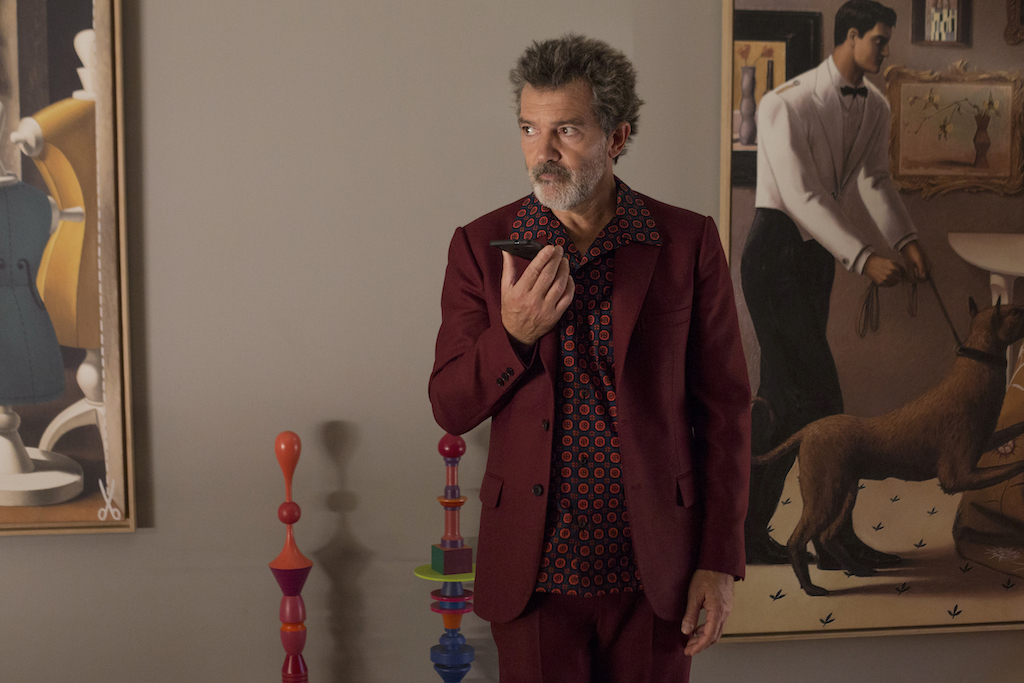
Pedro Almodóvar started his career making eye-popping works of delectable camp, then eased into a period of rich, female-focused melodrama. I’ve loved it all. But his latest film is something none of his previous works have been: It’s quiet, bordering on subdued. The director is in a reflective mode. The film is clearly at least partly autobiographical.
The Pedro stand-in here is his longtime collaborator Antonio Banderas, who was sex on legs when Almodóvar first cast him in Tie Me Up! Tie Me Down! and is now convincingly playing Salvador Mallo, a 60ish auteur in the twilight of his life and career. Banderas is styled to look a bit like his director—a grey beard; a mop of unruly waves—and he reportedly even wears some of Almodóvar’s actual clothes (pajama-style silk shirts and jewel-toned blazers). He is still, in case any of you were concerned, a babe.
Salvador hasn’t made a film in years, because he is beset by a series of physical ailments—migraines, back pain, asthma, and mysterious choking fits. He’s also depressed. (In that great human paradox, he’s depressed because he no longer works and he no longer works because he’s depressed.)
The thing that sets off the action of the plot is a revival of one of his earlier films, Sabor. “It’s apparently become a classic now,” he says, dryly.
The filming of Sabor was a charged experience that resulted in a permanent rupture in his friendship with its leading man, Alberto (Asier Etxeandia). Having recently revisited the film, Salvador realizes he was perhaps too hard on Alberto. He thinks a perfect way to mend that fence would be to invite him to the reissue’s premiere.
Salvador goes to visit Alberto, a straggly-haired aging rocker type, who reluctantly lets him in and immediately begins smoking heroin. Much to Alberto’s surprise, Salvador asks if he can have some.
What follows, I must say, is the most blasé
film about heroin addiction I’ve ever seen. Salvador does, indeed, become mildly hooked on the substance, but this is treated as a minor plot point, yet another symptom of his general weariness.
Meanwhile, he’s been thinking a lot about his childhood, especially his beautiful, beloved mother (Penélope Cruz). In some of the film’s best scenes, we see young Salvador (Asier Flores) as a dreamy, precocious child, who adores music and cinema. The family was so poor they had to live in underground cave houses, carved out of stucco and stone (there are no windows, but there is a “courtyard” of sorts, with a skylight). Salvador’s mother does everything in her power to make this hovel homey. And prepubescent Salvador is also finding himself preoccupied with the sensitive, hunky young workman he is teaching to read. That young man inspires Salvador’s first intense stirrings of erotic longing.
The film, which pivots back and forth between contemporary times and scenes from Salvador’s childhood, is mostly about how adult Salvador, through a series of minor and major events, eventually gets his artistic groove back.
As Salvador, Banderas gives his most confident, mature performance to date. Nine out of ten times, when an actor plays an addict, they seem to be gunning for an Oscar. But Banderas’ still, melancholy work is precisely what makes his performance so special (he did, indeed, win Best Actor at the Cannes Film Festival). He never overdoes it; he allows himself to depict a man overcome by ennui.
Still, much as I admired Banderas’ performance, and both the film’s striking beauty and its soul-baring honesty, I almost found that ennui too oppressive. It’s a film about artistic inertia that comes dangerously close to feeling inert itself. It’s interesting that Almodóvar’s most personal film is also his most subdued. My films are flamboyant, he seems to be saying, but I am not.
